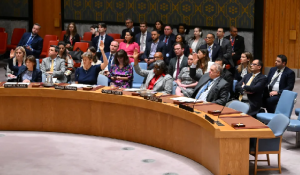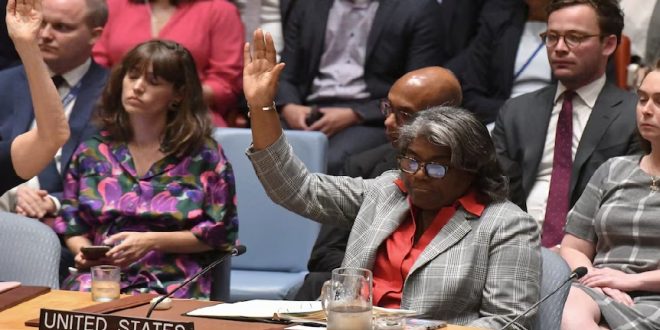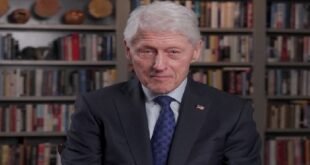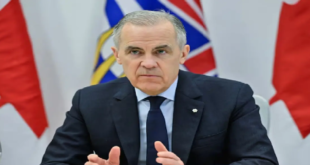11-06-2024
UNITED NATIONS: The United Nations Security Council has voted to support a US-proposed Israel-Gaza ceasefire plan.
The proposal sets out conditions for a “full and complete ceasefire”, the release of hostages held by Hamas, the return of dead hostages’ remains and the exchange of Palestinian prisoners.
Fourteen of the 15 Security Council members voted in favor of the US-drafted resolution. Russia abstained.
The resolution states that Israel has accepted the ceasefire proposal, and urges Hamas to agree to it too.
 It means the Security Council joins a number of governments, as well as the G7 group of the world’s richest nations, in backing the three-part plan that was unveiled by President Joe Biden on 31 May.
It means the Security Council joins a number of governments, as well as the G7 group of the world’s richest nations, in backing the three-part plan that was unveiled by President Joe Biden on 31 May.
The vote is likely to increase pressure on both sides to respond positively to the plan with a view to ending the conflict. It also came shortly after US Secretary of State Antony Blinken met with foreign leaders, including Israeli Prime Minister Benjamin Netanyahu in an attempt to build support for the peace deal.
Just hours before the UN vote, Blinken said his message to leaders in the region was: “If you want a ceasefire, press Hamas to say, yes.”
The group has previously said it supports parts of the plan, and it released a statement on Monday “welcoming” the Security Council resolution. Hamas is likely to demand guarantees the plan would lead to a permanent ceasefire and full Israeli withdrawal from the Gaza Strip.
Its political leadership in Doha has yet to formally respond to the proposal, according to US and Israeli officials.
The proposal would end with a major reconstruction plan for Gaza, which has been largely destroyed in the conflict.
The first phase concerns a hostage-prisoner swap as well as a short-term ceasefire.
The second phase includes a “permanent end to hostilities”, as well as a full withdrawal of Israeli forces from Gaza, according to a text of the US draft resolution.
The third phase focuses on the enclave’s long-term outlook, and it would start a multi-year reconstruction plan for Gaza.
Monday’s resolution comes 10 days after President Biden said the Israelis had agreed to the plan but Netanyahu has not yet endorsed the US proposal.
 While Biden presented the peace initiative as an Israeli one, the US is also aware Israel’s own fractious ruling coalition is approaching the plan with reluctance. This extends to outright opposition by some far-right ministers who are threatening to trigger a collapse of the government if the deal progresses.
While Biden presented the peace initiative as an Israeli one, the US is also aware Israel’s own fractious ruling coalition is approaching the plan with reluctance. This extends to outright opposition by some far-right ministers who are threatening to trigger a collapse of the government if the deal progresses.
The resignation of former general Benny Gantz from the war cabinet on Sunday has deepened that sense of instability.
President Biden’s account on X, formerly Twitter, noted the passage of the resolution. “Hamas says it wants a ceasefire,” the post said. “This deal is an opportunity to prove they mean it.”
Linda Thomas-Greenfield, the US Ambassador to the UN, said: “Today we voted for peace”.
UK Ambassador Barbara Woodward described the situation in Gaza as “catastrophic”, adding that the “suffering has gone on for far too long”.
“We call upon the parties to seize this opportunity and move towards lasting peace which guarantees security and stability for both the Israeli and Palestinian people,” Woodward said.
UK Foreign Secretary David Cameron also welcomed the resolution.
On 25 March, the UN Security Council passed a resolution calling for a ceasefire.
While the US had previously vetoed similar measures, it did not veto the March resolution. Netanyahu said at the time that the US had “abandoned” its prior position linking a ceasefire to the release of hostages.
The conflict began when Hamas attacked southern Israel on 7 October, killing about 1,200 people and taking some 251 people hostage.
The Hamas-run health ministry says the death toll in Gaza has surpassed 37,000 since Israel responded to its attack. (Int’l Monitoring Desk)
 Pressmediaofindia
Pressmediaofindia




